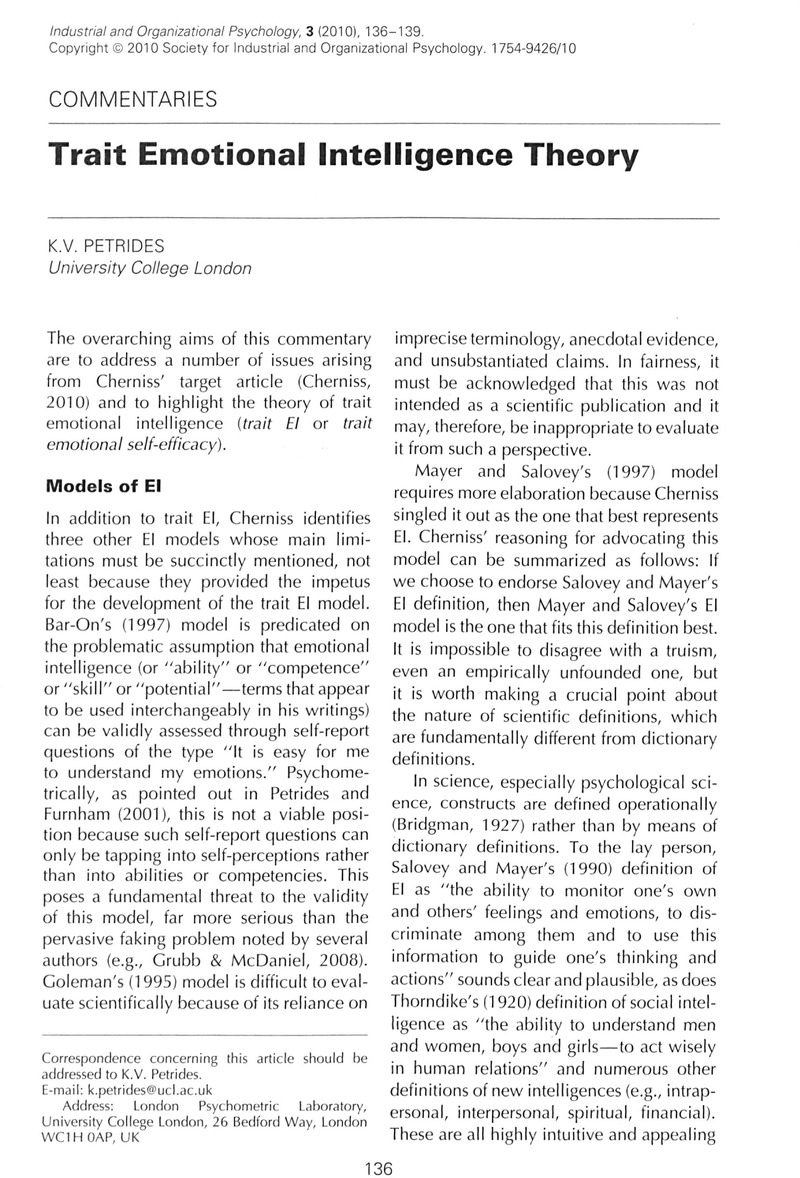Crossref Citations
This article has been cited by the following publications. This list is generated based on data provided by Crossref.
Cherniss, Cary
2010.
Emotional Intelligence: New Insights and Further Clarifications.
Industrial and Organizational Psychology,
Vol. 3,
Issue. 2,
p.
183.
Smollan, Roy
and
Parry, Ken
2011.
Follower perceptions of the emotional intelligence of change leaders: A qualitative study.
Leadership,
Vol. 7,
Issue. 4,
p.
435.
Arora, Sonal
Russ, Stephanie
Petrides, K. V.
Sirimanna, Pramudith
Aggarwal, Rajesh
Darzi, Ara
and
Sevdalis, Nick
2011.
Emotional Intelligence and Stress in Medical Students Performing Surgical Tasks.
Academic Medicine,
Vol. 86,
Issue. 10,
p.
1311.
Lindebaum, Dirk
and
Cartwright, Susan
2011.
Leadership effectiveness: the costs and benefits of being emotionally intelligent.
Leadership & Organization Development Journal,
Vol. 32,
Issue. 3,
p.
281.
Fukuda, Eriko
Saklofske, Donald H.
Tamaoka, Katsuo
and
Lim, Hyunjung
2012.
Factor Structure of the Korean Version of Wong and Law’s Emotional Intelligence Scale.
Assessment,
Vol. 19,
Issue. 1,
p.
3.
Libbrecht, Nele
and
Lievens, Filip
2012.
Validity evidence for the situational judgment test paradigm in emotional intelligence measurement.
International Journal of Psychology,
Vol. 47,
Issue. 6,
p.
438.
Nikoopour, Jahanbakhsh
Farsani, Mohammad Amini
Tajbakhsh, Mohammad
and
Kiyaie, Seyedeh Hoda Sadat
2012.
The Relationship between Trait Emotional Intelligence and Self-efficacy among Iranian EFL Teachers.
Journal of Language Teaching and Research,
Vol. 3,
Issue. 6,
Fox, Matthew
2013.
Putting Emotional Intelligence to Work.
Journal of the Academy of Nutrition and Dietetics,
Vol. 113,
Issue. 9,
p.
1138.
Siegling, Alexander B.
Vesely, Ashley K.
and
Saklofske, Donald H.
2013.
Advancing the trait EI content domain: Further evidence for the distinctiveness of interpersonal facets.
Personality and Individual Differences,
Vol. 54,
Issue. 1,
p.
81.
Føllesdal, Hallvard
and
Hagtvet, Knut
2013.
Does emotional intelligence as ability predict transformational leadership? A multilevel approach.
The Leadership Quarterly,
Vol. 24,
Issue. 5,
p.
747.
McCleskey, Jim
2014.
Emotional intelligence and leadership.
International Journal of Organizational Analysis,
Vol. 22,
Issue. 1,
p.
76.
Ko, Flora S.L.
and
Siu, Andrew M.H.
2014.
Validation of a Chinese version of the Assessing Emotions Scale for measuring the emotional intelligence of Chinese adolescents.
International Journal on Disability and Human Development,
Vol. 13,
Issue. 1,
p.
79.
Libbrecht, Nele
Beuckelaer, Alain De
Lievens, Filip
and
Rockstuhl, Thomas
2014.
Measurement Invariance of the Wong and Law Emotional Intelligence Scale Scores: Does the Measurement Structure Hold across Far Eastern and European Countries?.
Applied Psychology,
Vol. 63,
Issue. 2,
p.
223.
Hubscher-Davidson, Séverine
2014.
Emotional Intelligence and Translation Studies: A New Bridge.
Meta,
Vol. 58,
Issue. 2,
p.
324.
Sanchez-Ruiz, Maria-Jose
and
Hernández-Torrano, Daniel
2014.
The complex relationship between creativity and affect / La compleja relación entre creatividad y afecto.
Estudios de Psicología,
Vol. 35,
Issue. 2,
p.
239.
Scalco, Andrea
Ceschi, Andrea
Sartori, Riccardo
and
Rubaltelli, Enrico
2015.
Trends in Practical Applications of Agents, Multi-Agent Systems and Sustainability.
Vol. 372,
Issue. ,
p.
199.
Scalco, Andrea
2015.
Trends in Practical Applications of Agents, Multi-Agent Systems and Sustainability.
Vol. 372,
Issue. ,
p.
237.
Goldring, Ellen
Cravens, Xiu
Porter, Andrew
Murphy, Joseph
and
Elliott, Steve
2015.
The convergent and divergent validity of the Vanderbilt Assessment of Leadership in Education (VAL-ED).
Journal of Educational Administration,
Vol. 53,
Issue. 2,
p.
177.
Keefer, Kateryna V.
2015.
Self-Report Assessments of Emotional Competencies.
Journal of Psychoeducational Assessment,
Vol. 33,
Issue. 1,
p.
3.
Gill, Lesley J
Ramsey, Philip L
and
Leberman, Sarah I
2015.
From Chaos to Safe Transformation: The Emotional Intelligence Learning Environment Model.
Journal of Organisational Transformation & Social Change,
Vol. 12,
Issue. 3,
p.
257.



